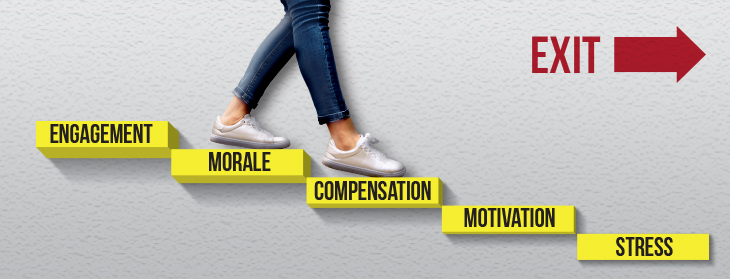
Why do we quit our jobs? We all have our reasons, and they aren’t the same.
Posted On December 10, 2018
While millennials have developed a reputation for job-hopping, we have in the past noted statistics that show Baby Boomers quit their jobs at a similar pace when in their 20s as well. Dissatisfaction in the workplace is not specific to a generation.
But why do we quit? And do those reasons differ between generations? These are questions that were recently put to the test recently in a study by PyschTests.com that was shared by PRWeb.com, which surveyed nearly 500 people with a Turnover Probability Test and got some interesting results.
While the reason cited most by millennials for leaving a job was compensation (54 percent), half or more also listed the lack of room for advancement (53 percent), bullying (52 percent), boredom (50 percent) and a lack of work-life balance (50 percent).
Perhaps surprisingly, bullying was also the reason cited most by Baby Boomers (58 percent). While it’s a phenomenon we typically associate with kids in school, Forbes recently noted a study finding that nearly 60 percent of U.S. workers are affected by bullying, which it defined as “being singled out for unfair treatment” or a pattern of “offensive, intimidating, malicious, or insulting behavior.”
More Boomers cited boredom (54 percent) than any other generation as well, showing that it’s not just millennials that need to be challenged. Boomers were also the generation most likely to cite micromanagement as a reason (47 percent).
And what about Generation X? Their top two reasons were bullying (50 percent) and office politics (50 percent). Gen-Xers were also the generation most likely to cite practical reasons, such as length of commute, as primary factors (38 percent), and were right behind millennials in citing the lack of room for advancement (49 percent).
What the study didn’t find is any significant difference between generations in likelihood of quitting, according to PsychTests President Ilona Jerabek.
“What’s important for managers to take note of is, of the 14 reasons why employees would quit their job, at least half are a result of circumstances that can be controlled,” PRWeb.com quoted Jerabek as saying. “If your company’s turnover rate is high … it’s time to take a serious look at not just your hiring process, but also engagement, morale, employee compensation, employee motivation and stress levels company-wide.”